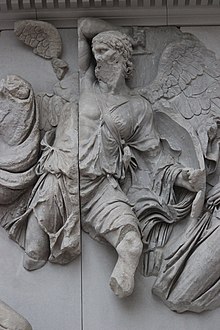
Uranus (mythology)
Primordial Greek deity, god of the sky / From Wikipedia, the free encyclopedia
Dear Wikiwand AI, let's keep it short by simply answering these key questions:
Can you list the top facts and stats about Uranus (mythology)?
Summarize this article for a 10 year old
In Greek mythology, Uranus (/ˈjʊərənəs/ YOOR-ə-nəs, also /jʊˈreɪnəs/ yoo-RAY-nəs),[3] sometimes written Ouranos (Ancient Greek: Οὐρανός, lit. 'sky', [uːranós]), is the personification of the sky and one of the Greek primordial deities. According to Hesiod, Uranus was the son and husband of Gaia (Earth), with whom he fathered the first generation of Titans. However, no cult addressed directly to Uranus survived into classical times,[4] and Uranus does not appear among the usual themes of Greek painted pottery. Elemental Earth, Sky, and Styx might be joined, however, in solemn invocation in Homeric epic.[5] Uranus is associated with the Roman god Caelus.[6][7][8][9]
| Uranus | |
|---|---|
Personification of the Sky and The Heavens | |
 Uranus depicted on the Gigantomachy frieze, Pergamon Altar, Pergamon Museum | |
| Abode | Sky |
| Genealogy | |
| Parents | Gaia (Hesiod) |
| Siblings | Pontus and the Ourea (Hesiod) |
| Consort | Gaia |
| Children | The Titans, the Cyclopes, the Hecatoncheires, the Erinyes (Furies), the Giants, the Meliae, and Aphrodite[1] |
| Equivalents | |
| Roman equivalent | Caelus |
| Mesopotamian equivalent | Anu[2] |